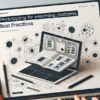Keys to Reflecting Continuous Learning on Your Resume

In today’s rapidly evolving web development landscape, showcasing your commitment to continuous learning on your resume is more important than ever. Employers aren’t just looking for skilled candidates; they’re searching for individuals who demonstrate a passion for growth and the ability to adapt to new technologies and methodologies. This comprehensive guide provides effective strategies for reflecting your continuous learning journey in your resume, ensuring you stand out in the competitive job market.
Highlighting Professional Development
Keep Learning Front and Center
Start by dedicating a section of your resume to your professional development initiatives. Label it “Professional Development,” “Continuous Learning,” or something similarly indicative. This section is the perfect spot to list courses, certifications, workshops, and webinars that you’ve taken part in, especially those related to HTML, PHP, CSS, JavaScript, and WordPress. Make sure to include completion dates to demonstrate your ongoing commitment to staying up-to-date.
Tailor Your Learning to the Job Description
Tailor the professional development section to the job you’re applying for. Highlight the learning experiences and certifications most relevant to the position. If you’re aiming for a role that emphasizes WordPress development, for instance, prioritize courses and certifications related to WordPress over less relevant learning experiences.Showcasing Projects and Contributions
Incorporate Real-world Projects
Employers value practical experience just as much as formal education. Under a “Projects” or “Portfolio” section, include websites or applications you’ve developed, emphasizing how you applied new technologies or concepts learned during your continuous education journey. For each project, briefly describe the problem you solved, the technologies you used (highlighting any new skills you had to learn), and the outcome.
Contribute to Open Source
Participating in open-source projects is another excellent way to demonstrate continuous learning. If you’ve contributed to open-source projects, especially those related to your target stack (HTML, PHP, CSS, JS, WordPress), make sure to include them in your resume. Discuss your contributions in detail, focusing on how they allowed you to learn new skills or frameworks.Leveraging Online Presence
Highlight Your Online Learning Path
In today’s digital age, online learning platforms offer countless opportunities for professional growth. Include any relevant online courses you’ve completed, again focusing on those most applicable to the job you’re applying for. This not only shows your dedication to learning but also your ability to self-motivate and manage your time effectively.
Showcase Your Blog or Website
If you maintain a professional blog or website, especially one related to web development, include a link in your resume (note: no actual links are included in this article as per the guidelines). This can serve as a tangible representation of your learning journey, showcasing your growth, knowledge, and any personal projects that reflect your skills and commitment to continuous development.Continuous Learning in the Job Experience Section
Frame Your Experience Around Learning
In the job experience section, highlight roles and responsibilities where you learned new skills or adapted to new technologies. Use action verbs like “implemented,” “adapted,” “upgraded,” and “learned” to illustrate your ability to grow and evolve professionally. This approach turns each job description into a narrative of your learning journey.
Conclusion
Reflecting continuous learning on your resume is crucial for web developers aspiring to stay ahead in the field. By strategically highlighting your professional development, projects, contributions, and online presence, you can demonstrate to potential employers not only your current skill set but also your potential for future growth. Remember, a resume that showcases a commitment to continuous learning is often the key to securing opportunities in the dynamic world of web development.
By optimizing your resume with these strategies, you’re not only improving your chances of catching a potential employer’s eye but also positioning yourself as a lifelong learner—a highly sought-after trait in the tech industry. Always keep learning, keep building, and let your resume be a reflection of your unyielding drive to grow and innovate.


